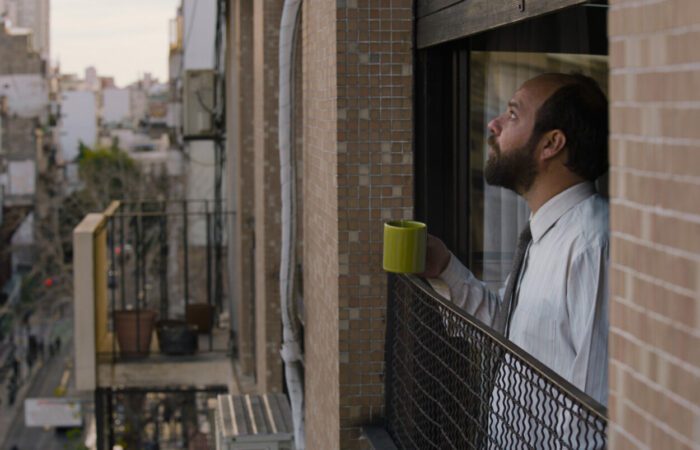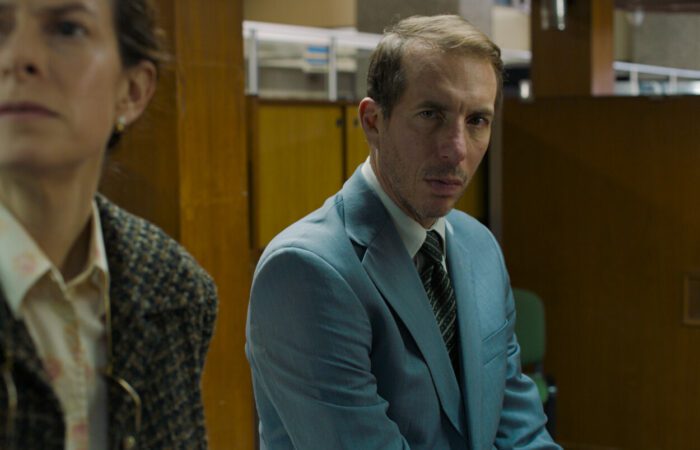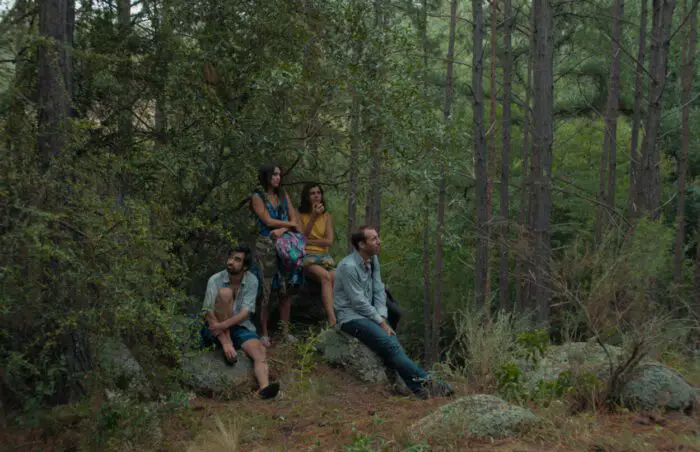Tantalizingly slow and consistently unpredictable, Argentine writer-director Rodrigo Moreno’s The Delinquents (Los delincuentes) is a heist movie like no other, a fever dream of two men whose plan to share the bounty of a crime takes them both on a path neither could have predicted. At three hours, The Delinquents takes the full measure of its two protagonists and the dreams to which they aspire, yet never falls into the formulaic traps of the genre; rather, Moreno’s is practically a deconstruction of the heist film that explores territory few such films ask. When the heist is finished—then what?
Served up in three discrete sections, each with its own title card, The Delinquents‘ first act takes place in a dreary Buenos Aires bank, where the bearded, balding, slightly potbellied Morán (Daniel Eliás) drudges through the monotony of his daily routine alongside his fellow, equally dull employees. A problem arises when one patron’s endorsement signature is an exact replica of another’s: can two people bear the same signature? It’s a question the film will explore in no small detail. Here, the mise en scène resembles nothing so much as middle-period Fassbinder, the bank’s doors, windows, and furnishings all serving to confine Morán and his compatriots in a corporate-capitalist prison where a career is little more than a lifelong sentence.

Morán has a scheme, though, to liberate himself: when the opportunity arises, he’ll abscond with a sum of cash—a fair one, he estimates, the equivalent of what he’d earn over the next 25 years, enough to support a modest retirement, times two—then confess, serve a three-year prison stint, and retire to a blissful life. He’ll need an accomplice, and both deserve reward. So he enlists his co-worker Román (Esteban Bigliardi) to hold the cash while Morán serves his prison time.
Román, though he lives with his music-teacher girlfriend and would seem to have a slightly more satisfying personal life than we see of Morán’s, is a hesitant but willing accomplice, and without spoiling much of The Delinquents‘ labyrinthine narrative, their heist is successful. Morán is arrested and imprisoned, Román hides away the funds, all according to plan. More than a few heist movies end right there, the crime’s success concluding the film.

Yet for all the sleight-of-hand skill evidenced in The Delinquents‘ first act, it’s barely a hint at the complications Moreno has up his sleeve in acts two and three, each approximately another hour long. Morán’s stint in jail is considerably more daunting than he’d imagined. Román, under pressure by a company investigator (Laura Paredes), heads to a remote hillside to hide the funds safely away, where he encounters a group of hippie filmmakers living an idyllic, carefree life, and falls in love with one of them named Norma (Margarita Molfino).
For both men, the remote hills of Argentina offer what looks to be a utopian bliss far away from the drudgery of their corporate existences. Román, Morán, Norma—each of their names anagrams of the others—find themselves in a strange cyclical pattern of events, repetitions and reoccurrences that call into question what actually occurs and when. It’s not Last Year at Marienbad, but there are just enough little Easter eggs and Russian dolls unfolding in an increasingly curious escape from convention.

By the time the final credits roll, I’m no longer completely confident I understand exactly what I’m seeing. That hardly diminishes my appreciation for The Delinquents, a film that is impeccably crafted, marvelously acted (especially from its two leads, Eliás and Bigliardi, but also from Molfino in a less complex role), and endlessly thought-provoking. For as stifling and claustrophobic the urban doldrums, the Argentine hillsides are equally open, beautiful, and foreboding. It’s a film that had me thinking of Huston’s Treasure of the Sierra Madre, Tati’s Playtime, Fassbinder’s Fox and His Friends, and Rivette’s L’Amour fou along the way—and Antonioni’s The Passenger at its ambiguous conclusion.
There is another thing of which I am certain: The Delinquents poses a problem with which many of us are all too familiar. We are today and long have been too, too subservient to the dollar—or, in this case, the peso, in another country the guinea, the pound, or the yen. The heist conceived and executed in The Delinquents does not solve the problem for the film’s like-named protagonists and in fact may only serve to illustrate how intractable the need for money may be. Only freed from it can they, or anyone, find peace. The film’s theme may be utopian, perhaps even naive, but it is, in this romantic, beguiling, occasionally surreal, frequently funny, and always engaging film, confident and unambiguous.
MUBI announces the North American theatrical release of The Delinquents (Los delincuentes), which has been announced as Argentina’s official candidate for the Academy Awards® best international feature. The Delinquents premieres at the 61st New York Film Festival on October 11 and October 12 and opens theatrically on Friday, October 18 in New York City with other cities to follow. 2023, 180 min. In Spanish with English subtitles.




